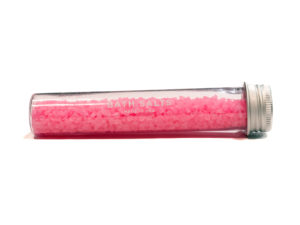When most people hear the term “bath salts,” they picture mineral soaks and dissolvable Epsom salts designed to alleviate sore muscles. But unfortunately, synthetic cathinones, a dangerous substance intended to get someone high, are marketed as “bath salts” and frequently sold in head shops and convenience stores. These bath salts come with a risk of addiction and can cause a range of side effects in the user. Thousands of people in the U.S. are admitted to emergency rooms every year from bath salt side effects. For people who are addicted to bath salts, there are many treatment options available for users and their loved ones that can help break the cycle of drug addiction.
What are bath salts?
Bath salts are synthetic cathinones that derive from the khat plant, a native shrub to southern Arabia and East Africa. The khat plant produces chemical compounds that induce a stimulant effect in people who ingest the plant. People who abuse synthetic cathinones will experience an intense high, increased energy, and impairment. Sometimes, synthetic cathinones are marketed as “jewelry cleaner,” “plant food,” and “phone screen cleaner.” But consumers should not be fooled. These are just descriptions that marketers use to avoid law enforcement detection. Synthetic cathinones have no other purpose than to get someone high. People will abuse bath salts as a cheaper way to experience a cocaine or methamphetamine high.
Even though bath salts are sold in stores, they are not legal. Synthetic cathinones have a chemical makeup that can be quickly changed and altered, and it’s difficult for drug enforcement agencies to keep up with the ever-changing face of synthetic cathinones. As soon as the authorities identify the substances and ban them from stores, chemists on the black market manage to produce an altered version of the drugs, allowing them to escape detection for a time. The packaging the drugs are sold in often has a disclaimer, “not intended for human consumption,” to further evade detection from the authorities.
Who typically abuses bath salts?
People who are addicted to stimulants like cocaine and meth will frequently abuse bath salts because they are cheaper than black market drugs, and they are sometimes easier to obtain. People may also mistakenly believe that bath salts are a safer way to get a high that’s found in meth and cocaine abuse since bath salts are sold in stores. Teens and young people between the ages of 18 and 25 are more likely to abuse bath salts than older individuals because they often want to experiment with different substances. For young teens, obtaining bath salts to experience a stimulant high is often easier than trying to find cocaine, MDMA, or methamphetamine from a black market dealer.
What is the definition of “abuse” when it comes to bath salts?
Any time a person uses a substance to become impaired or uses a substance for something other than what it is intended, it is considered abuse. Bath salts, even though they may be labeled as a cleaning product, are not meant to do anything other than give the user a stimulant high.
A person will either swallow bath salts, crush and snort them, or dissolve them into a liquid and inject the drugs intravenously. Snorting and injecting bath salts are the most dangerous ways to get high on these substances. Injecting any drug comes with a significant risk of infection, collapsed lungs, and possible infection with a bloodborne pathogen.
What are the signs of bath salts abuse?
The way a person abuses bath salts will have certain signs particular to their method of using the drugs. If someone snorts or swallows bath salts, they may have traces of the substance on their nose, or around their mouth. Injecting bath salts will leave behind track marks on the user’s skin, and loved ones may find evidence of hypodermic needles, tourniquets, and tools to dissolve the bath salts in a user’s room. Signs that someone is high on bath salts may include the following:


